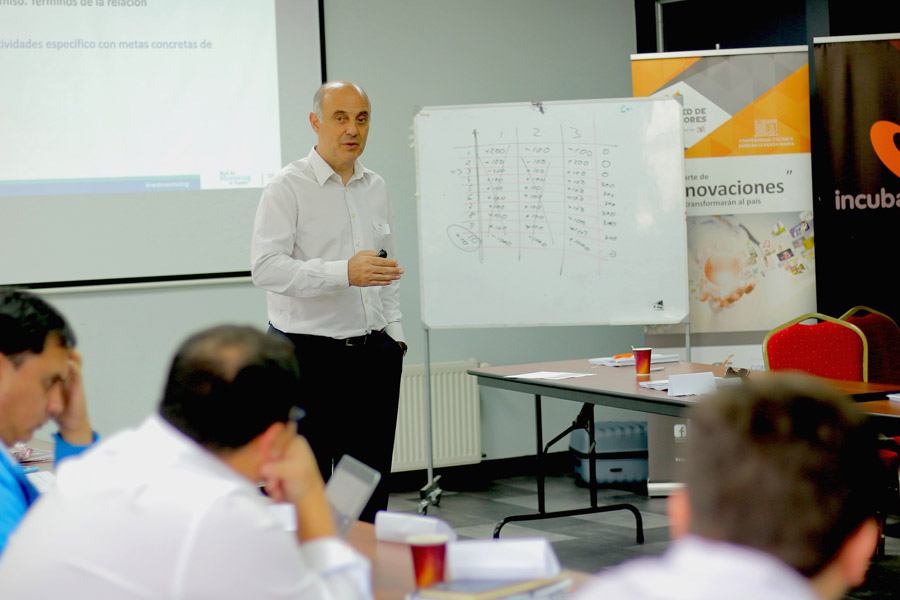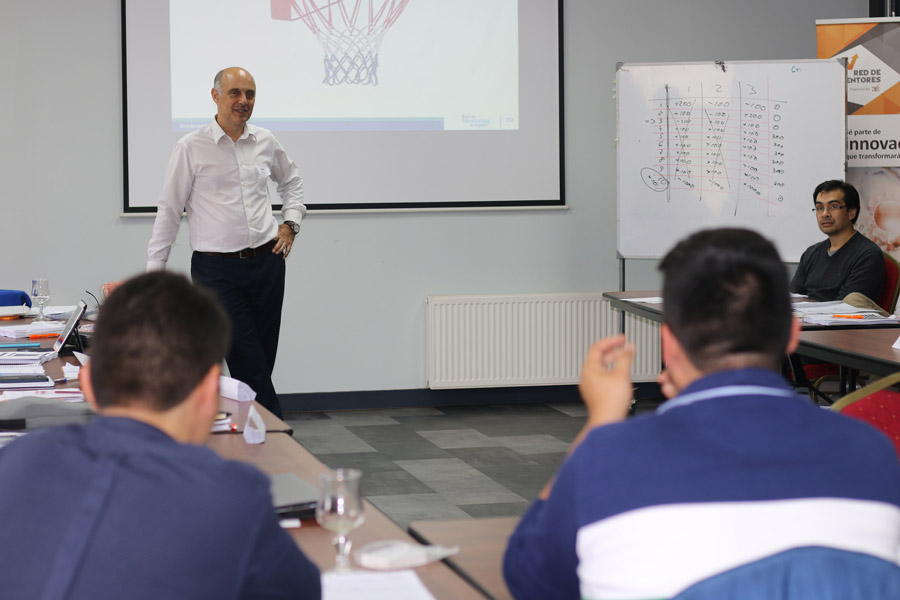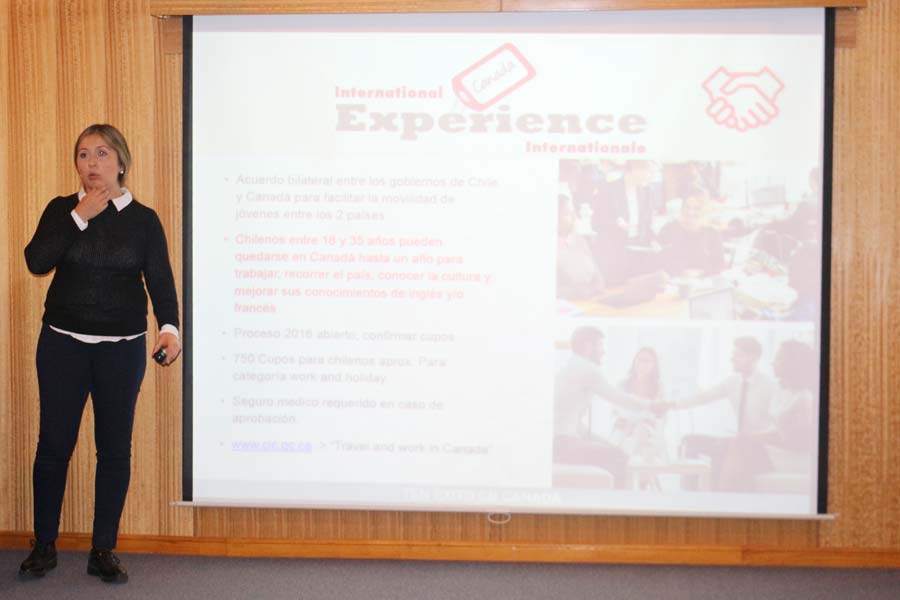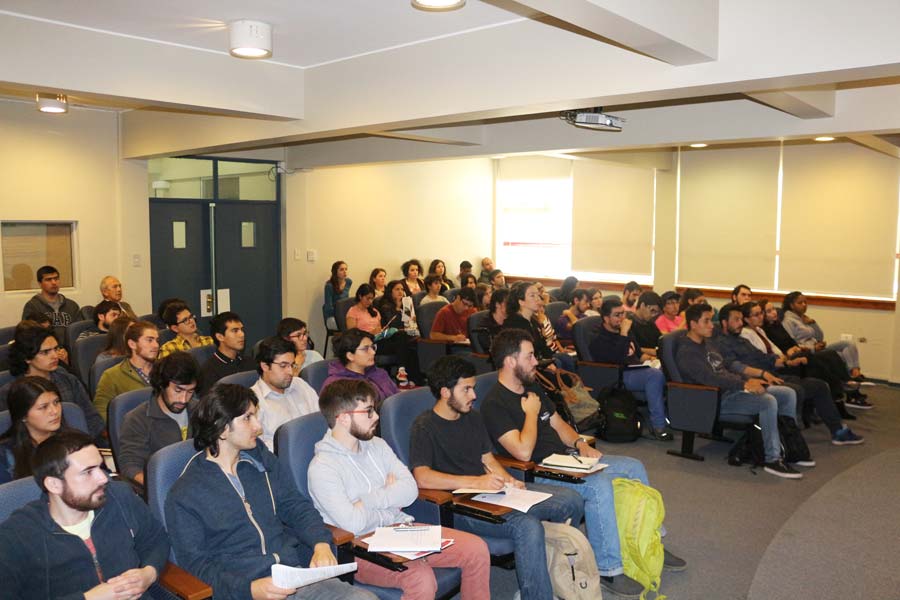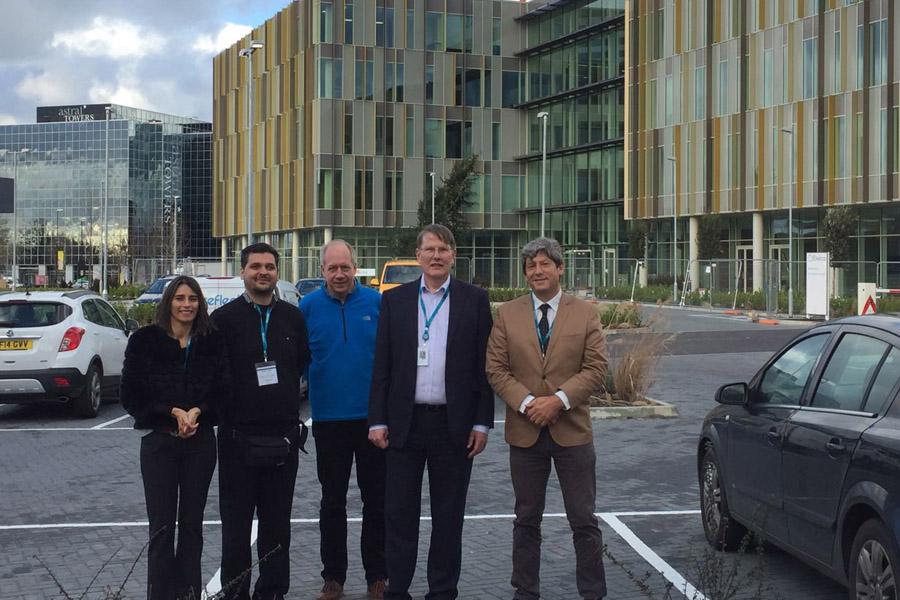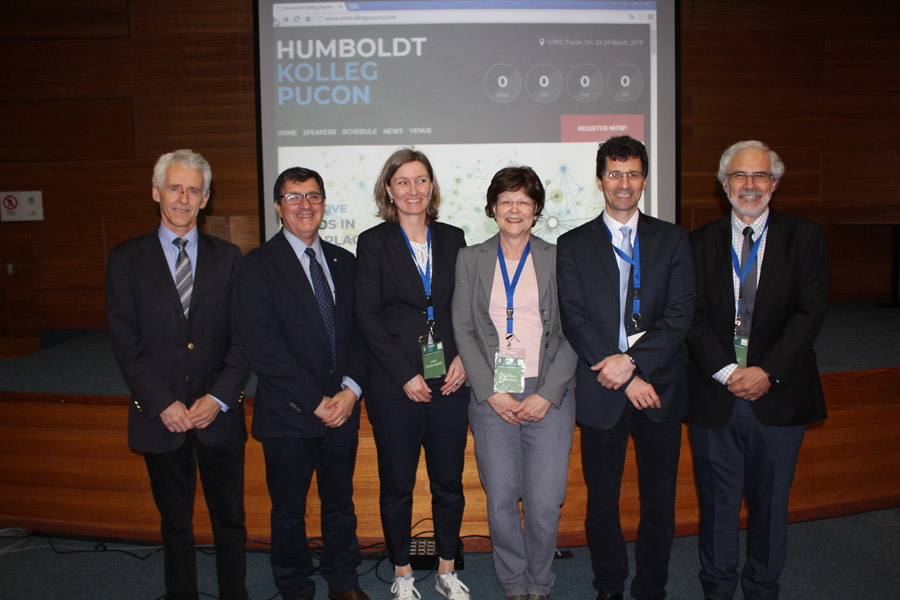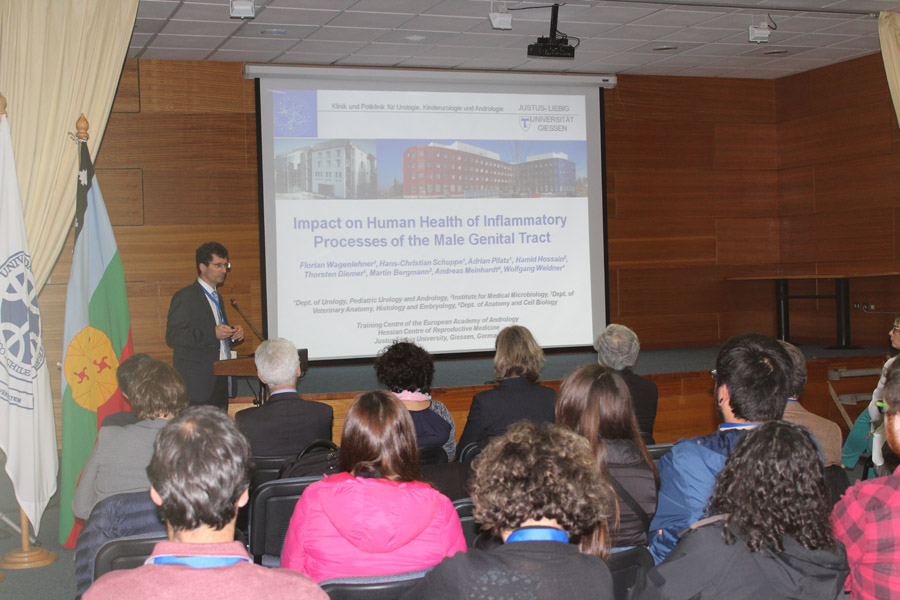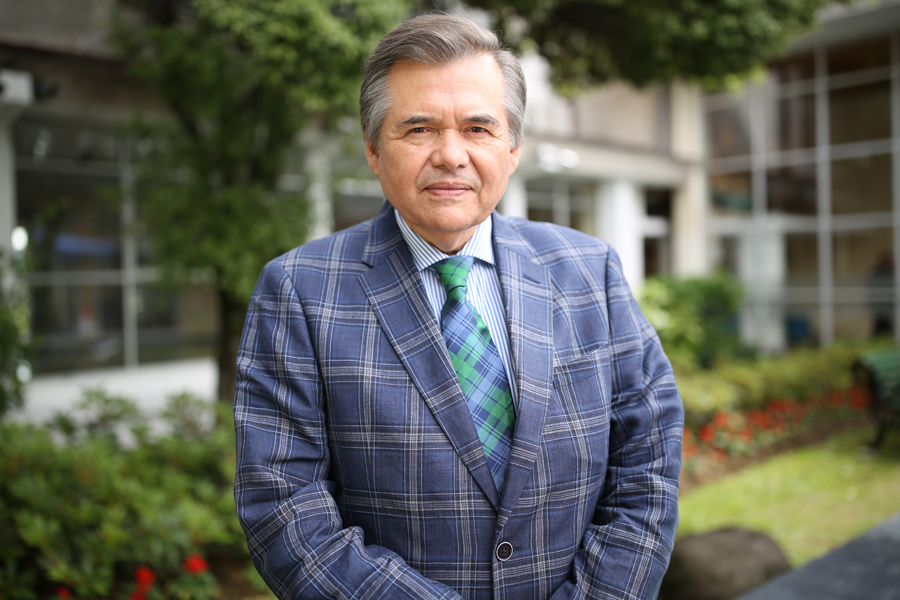|
The Program of international certification was organized by the Mentoring Network of the 3IE Institute at the Technical University Federico Santa María in Spain, and carried out by Mentoring Spain, supported by CORFO (Production Development Corporation) and IncubatecUFRO. |
After participating in an unprecedented initiative in the South of Chile, which promotes the development of necessary skills and competencies to lead a mentoring process in an entrepreneurial environment, professionals and teachers of the Macro Faculty of Engineering were internationally certified. The Program of International Certification in Mentoring was organized by the Mentoring Network of the 3IE Institute at the Technical University Federico Santa María in Spain, and carried out by Mentoring Spain, supported by CORFO and IncubatecUFRO (the Business Incubator of the Universidad de La Frontera). During two days, professionals and teachers of the Macro Faculty of Engineering of the Universidad de La Frontera, the Universidad Bio Bio (UBB), IncubatecUFRO, and other organizations related to entrepreneurship and innovation in this Region were part of this activity directed by Julio Diaz, director of Mentoring Spain. In different dynamics, the expert gave details about the methodologies and tools that are necessary to lead a mentoring process in the best way. “With this certification, we are training the participants in eleven basic competencies a good mentor needs and in the processes and steps they have to follow at the moment of mentoring. The training system we use is innovative – with dynamics, exercises and role-plays. We think this is very effective, since they experience what they are doing and have to put it into practice afterwards. This is what we evaluate at the end”, he explained. “Once the training is over, the participants have to take a test about their knowledge in order to verify if they internalized what they did in class. Afterwards, we evaluate a mentoring practice. We get in contact with the entrepreneur they have been supporting or will support when the training ends, and what we do is to check if they are doing an effective mentoring process”, he added. PARTICIPANTS The academic staff member of the UFRO Macro Faculty, Juan Pablo Cárdenas, said that this activity “opens a door for us and our work we do at the academy. Here, we give them structures and concepts that permit us to do correct work and to project it, with methodologies and techniques that help us to optimize the processes and accompany someone who wants to start a business or develop a project in a good way.” For the project engineer of the Node for Innovation and Technology of the UBB, Fabian Zambrano, the acquired experience in the program will help to do better work accompanying the entrepreneurs the Macro Faculty supports. “For the students, the support by a mentor will permit them to create a better business model, to define the idea well and to transform it into a product that can be commercialized. We want to be a support for them in this process. Therefore, we think that this certification will position us and permit us to build capacities in this field”, he concluded. Written by: Mauricio Antivil
Enginering Project 2030 |
|
In an information seminar, the representative of the Canadian embassy in Chile informed about the most important facts to consider when the students apply to scholarships and about the opportunities for studying in Canada. The seminar was organized by the UFRO International Affairs Office and the National and International Student Mobility Office. |
Canada is among the top ten countries in education worldwide and has a high index of happiness. It is a country that does not stop to grow as an attractive destination for undergraduate and postgraduate students. It has also been inspiring for Chilean students and young professionals who decided to join this adventure in a place that is more than 10 thousand kilometers away from Chile. Taking the interest and agreements the Universidad de La Frontera has with different Canadian higher education institutions into consideration, the coordinator of Academic Affairs of the Canadian embassy in Chile, Priscila Lopez, visited the Andrés Bello Campus and held an information seminar. “To study in Canada means to enter into a prestigious atmosphere. The Canadian universities are of excellent quality regarding their programs and investment in their fields of study – there are scholarships, such as the Emerging Leaders in the Americas Program and the Canada-Chile Leadership Exchange Scholarship – in addition, it is a country that offers multiculturality and development, essential components for any student who wants to life an international experience on a high level“, said Priscila Lopez. OPPORTUNITIES The International Affairs and the National and International Student Mobility Office brought undergraduate and postgraduate students together with the idea to spread information about these study opportunities. The Emerging Leaders in the Americas Program (ELAP) and the Canada-Chile Leadership Exchange Scholarship fulfill the objective of supporting the development of human capital and the new generation of leaders, and at the same time, of strengthening the link between institutions of both countries. These scholarships are for short study or research stays, for one semester, and grant 7.200 CAD for undergraduate students and 9.700 CAD for postgraduate students (studying 5-6 months abroad). The calls open on April 12th and the scholarships are available each year. This is why we invite the students to be attentive to these calls. In order to complement the seminar, the biotechnology student, Benjamin Duran from Chile, shared his experiences as an international student at the University of Regina in Canada with the ELAP scholarship. “I learned a lot. The level of the infrastructure and equipment of the laboratories is very advanced. What remains the most in my head is the strong support the students receive, from teachers as well as from their fellow students. That University has departments that are specialized in the support of the students´ development and dedicated to inclusion.” The person in charge of the UFRO National and International Student Mobility Office, Antonia Espinoza, added that “this unit opens calls in order to support the students who want to study in Canada and the Canadian government finances three existing agreements. In this case, the Universidad de La Frontera has active links with different institutions and, this way, we make the contacts for the students´ admission.” She also emphasized that the good experiences aroused the interest of the Canadian Embassy in Chile to do this dissemination activity. Written by: Pamela Carrasco
Communications Division |
|
The Universidad de La Frontera starts to position a research line of importance for the whole world. Significant results in cancer treatment are expected because of this innovative idea. We are the first university in creating, designing and putting into operation an alternative device for radiation therapy treatment. |
When Dr. Rodolfo Figueroa decided to use his knowledge in physics to apply it to the field of medicine, he never thought that this idea of creating a device for focused radiation therapy would interest a company like Elekta, the second largest radiation therapy devices manufacturing company in Europe. As the result of a Fondef (Fund for the Promotion of Scientific and Technological Development) Project that started in 2015, Dr. Figueroa and other researchers in that field have revolutionized the medical field by presenting the design, creating and putting into operation a compact device that emits convergent X photons as they are used in external radiation therapy and favors the dose distribution compared to other techniques used at the present. The result is an improved effectiveness in radiation therapy and it generates an excellent profile regarding the profound doses since the dose can be concentrated more precisely without damaging healthy organs around the tumor. CONTACT WITH THE BEST And this presentation has been one of the most important for them to promote their idea. They were able to show it to one of the most selective and demanding groups in the world. Among them, Kevin Brown, the Elekta VP of Research and Innovation and John Ellen, the Engineer and Director of Elekta in the UK. “We showed our scientific productivity with 12 scientific publications and 3 associated patents. The accompaniment of the director of Innovation and Technology Transfer, Claudine Uribe, Dr. Mauro Valente and Dr. Oelfke who made this possible, were also key”, Figueroa said. The current aim of the researchers is a partnership with Elekta and at the moment they are waiting for the final report on how the company is going to support this innovation. In case of a positive response, the impact for Latin America would be enormous: Chile would be the first country with an alliance of this nature, and the UFRO would position itself in a field of worldwide interest. “They saw that we are doing serious and impeccable work”, the researcher added. THE NUMBERS OF THE EUROPEAN GIANT Elekta is a manufacturer of cancer treatment equipment and software. Their equipment is installed in more than 6000 hospitals all over the world and their specialty is radiation therapy, radiosurgery and brachytherapy. They own about 39% of the radiation therapy market with sales in over 120 countries. About 1.5 million patients receive treatment with Elekta systems each year. They are leading in Asia and Europe. The sales exceed 1,190 USD and the EBITDA is of 185 (2017/2016). 20% of the work force is dedicated to innovation. The investment in R&D reached 132MM USD. 11% of the net sales were designated to R&D and tendencies of growth because of the lack of equipment in low- and middle-income countries. Only 10% have access to radiation therapy. Most of the 13000 Elekta devices are installed in developed countries. Out of the total of cancer patients in the world, only 25% are treated with radiation therapy, while the rate suggested in different studies is 50%. The market in emerging countries is one of the priorities of Elekta and innovation is one of the pillars for the current and future growth. In this field, they have a number of collaboration agreements with cancer treatment centers. |
|
Foreign and national researchers in translational medicine came together in a Humboldt Colloquium at the UFRO and activated networks of joint work |
On March 23rd and 24th, researchers, doctoral and postdoctoral students of this Institution came together at the Pucon Campus of the Universidad de La Frontera, together with members of the Alexander von Humboldt Foundation. Since 2010, six similar events took place in Chile, but at other universities (Catholic University of Chile, Diego Portales University and University of Chile). This is the first time the UFRO has been selected, under the impetus of Dr. Raul Sanchez. TRANSLATIONAL MEDICINE Translational medicine associated with parasitology, cancer, immunology and reproduction were some of the topics at the Colloquium which offered a wide range of topics to the participants from Brazil, Argentina, Colombia, Uruguay and Chile, together with the speakers from Germany who talked about the importance of validating science and how to show that your work is made of quality. The director of the division for Central and South America of the Alexander von Humboldt Foundation, Dr. Anne Sperschneider, was the main ambassador of the German entity in Temuco. “This is an historical fact, because Raul Sanchez, one of our former scholarship holders, decided to ask for funds to support this event and we are happy that it was possible and that young Chilean researchers apply for our scholarships the same way as people from other countries do.” The cooperation between Germany and Chile has a long history in our Region. This is why the honorary consul of the European country in our Region, Carlos Fingerhut, expressed his satisfaction with the visit of the Foundation. “I am very happy that this seminar took place here. We have a very strong relationship in the field of university education, in the exchange of teachers and between the universities. The Humboldt Foundation finances scholarships for postgraduate students and researchers in order to get specialized training in Germany, and they act all over the world, since they give importance to these alliances with other countries and in research.” HUMBOLDTANIANS The main organizer of the event, Dr. Raul Sanchez, evaluated the event. “The students were able to interact with the invited professors in an atmosphere of trust and they were able to ask what they wanted to. Work networks were created between the senior and post-doc researchers with representatives from Latin America and Europe, as well as the necessary instances for coming back to Chile. It was a good experience and it met the main expectation which was to create networks.” They were able to plan other visits of the European researchers in Temuco, soon, but the most important point was “to strengthen the relationships, since they estimated the level of UFRO research. It also opened the possibility for our students to apply for scholarships for an advanced international symposium in reproduction that will take place in Uruguay.” The dean of the Faculty of Medicine, Dr. Patricio Valdés, also analyzed the activity. “It is important to have an event like that with guests from Germany with a high scientific production in the fields of reproductive health, molecular biology and stem cells. This implies the strengthening of the center of translational medicine in basic science and medical science. It has been a great opportunity to create networks and alliances between researchers.” “We expect a high participation of our young researchers and that they decide to apply and that the network of humboldtanians in Chile and the UFRO will be renewed and rejuvenated, because we do not want that Raul is the only one. The researchers can apply from all scientific fields, since there are no limits – from social sciences to medicine, physics, engineering, all areas,” they commented.
Written by: Fabián Aguirre
Faculty of Medicine |
|
In his annual statement, the highest authority of our University, Sergio Bravo, led us through the work done in research, postgraduate affairs and innovation. |
In a process that started more than a decade ago, the Universidad de La Frontera has been focusing its efforts on the transformation into a complex institution of prestige and with relevant indicators. Looking back on the last year, the highest authority of this institution led us through the work done in the fields of research, postgraduate affairs and innovation. How does the UFRO position itself in the Rectors´ Council compared to other universities? Which direction is the UFRO going to take from now on? At the same time, another task is to think about how to strengthen the postgraduate area. The training of advanced human capital is one of our highest distinctions and our offer underlines that. What is going to happen next? How can we stay in this scenery? Is there anything the Institution has to consider? The topic outreach and community engagement is something that will distinguish the universities in the short term. We have to be actively engaged with the community, approach the citizens, listen to their demands and provide solutions. It is about innovation at the service of people and the UFRO is totally aligned with the national and international tendencies. What distinguishes us in the national scene of science? Today, 450 WoS publications of 2017, 119 ongoing and 40 approved Fondecyt projects, as well as 49 innovation projects we will start in 2018, convert us into the best University in our Region and one of the 10 best universities in Chile.
Written by: Lorena Espinoza
Vice-rectorate of Research and Postgraduate Affairs |





